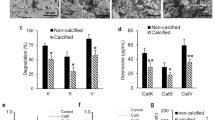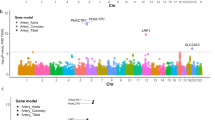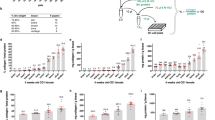Abstract
COLLAGEN comprises 40–60% of the protein1,2 and 30% of the weight3 of human fibrous atherosclerotic plaques. Its deposition in the arterial intima is largely responsible for the occlusive and irreversible nature of coronary and cerebral arterial disease. Four genetically distinct types of collagen have been identified in mammalian tissues and atleast five structural genes are involved in their synthesis4. The transcription of these various genes seems to be tissue specific. Type I collagen is found in tendon, bone and adult skin, type II is found in cartilage and intervertebral disk, and type IV is restricted to basement membrane. Type III collagen was observed first in newborn human skin5 and has been isolated and characterised from human aorta and leiomyoma6. Initial reports identified both types I and III in human aorta4,7. We have now found that fibrous atherosclerotic plaques contain proportions of these two collagens which are different from those occurring in normal arterial wall.
This is a preview of subscription content, access via your institution
Access options
Subscribe to this journal
Receive 51 print issues and online access
$199.00 per year
only $3.90 per issue
Buy this article
- Purchase on Springer Link
- Instant access to full article PDF
Prices may be subject to local taxes which are calculated during checkout
Similar content being viewed by others
References
Smith, E. B., J. Atheroscler. Res., 5, 241 (1965).
Anastassiades, T., Anastassiadis, P. A., and Denstedt, O. F., Biochim. biophys. Acta, 261, 418 (1972).
Levene, C. I., and Poole, J. C. F., Br. J. exp. Path., 43, 469 (1962).
Miller, E. J., and Matukas, V. J., Fedn. Proc., 33, 1197 (1974).
Miller, E. J., Epstein, E. H., and Piez, K. A., Biochem. biophys. Res. Commun., 42, 1024 (1971).
Chung, E., and Miller, E. J., Science, 183, 1200 (1974).
Trelstad, R. L., Biochem. biophys. Res. Commun., 57, 717 (1974).
Miller, E. J., Biochemistry, 11, 4903 (1972).
Chung, E., Keele, E. M., and Miller, E. J., Biochemistry, 13, 3459 (1974).
Wissler, R. W., J. Atheroscler. Res., 8, 201 (1968).
Ross, R., and Glomset, J. A., Science, 180, 1332 (1973).
French, J. E., Int. Rev. exp. Path., 5, 253 (1966).
Buck, R. C., in Atherosclerosis and its Origin (edit. by Sandler, M., and Bourne, G. H.), 1 (Academic, New York, 1963).
Parker, F., and Odland, G. F., Am. J. Path., 48, 197 (1966).
Ross, R., in Treatise on Collagen, 2 A (edit. by Gould, B.S.) (Academic, New York, 1968).
Author information
Authors and Affiliations
Rights and permissions
About this article
Cite this article
MCCULLAGH, K., BALIAN, G. Collagen characterisation and cell transformation in human atherosclerosis. Nature 258, 73–75 (1975). https://doi.org/10.1038/258073a0
Received:
Accepted:
Issue Date:
DOI: https://doi.org/10.1038/258073a0
This article is cited by
-
Second harmonic generation light quantifies the ratio of type III to total (I + III) collagen in a bundle of collagen fiber
Scientific Reports (2021)
-
Effect of Long-Term Exercise Training on lncRNAs Expression in the Vascular Injury of Insulin Resistance
Journal of Cardiovascular Translational Research (2018)
-
Fluorescence multispectral imaging-based diagnostic system for atherosclerosis
BioMedical Engineering OnLine (2016)
-
Effect of glycated collagen on proliferation of human smooth muscle cells in vitro
Diabetologia (1996)
Comments
By submitting a comment you agree to abide by our Terms and Community Guidelines. If you find something abusive or that does not comply with our terms or guidelines please flag it as inappropriate.



